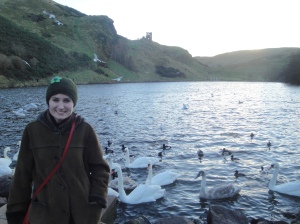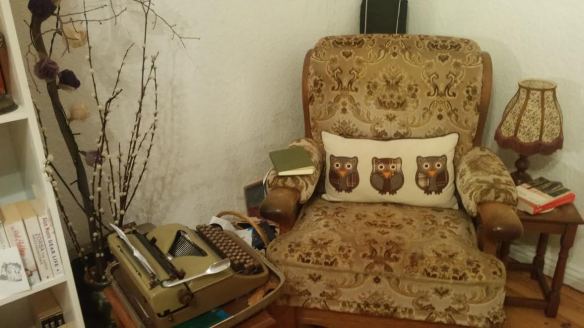Earlier this morning, I was asleep on a plane with a copy of Anna Karenina abandoned on my knee, when I was jolted awake by an adapter plug, which hit me in the face. I looked up to see a young man hovering over me. He looked mortified.
He had been searching for something in his case in the luggage carrier over my head and seemed startled to have launched a missile.
“I’m so sorry!” he said, grabbing the offending converter.
“Don’t worry!” I said, compensating for my drowsiness by employing an inappropriately bright tone.
He then had the unenviable obligation to continue looking for whatever he needed while leaning over me.
It was a laptop. He took it to his seat, which was diagonally across from me, and opened up a Word file containing many pages of text. The font was too small for me to make out. He must have sensed my dismay because just as I was craning my neck to make the title out, he turned to me and apologised again.

Kate Katharina being unimaginative among natural beauty recently.
“Not a problem!” I said, waving my hand as if flicking away some trifling annoyance, like a fly or an undeserved compliment.
I thought that if this were the beginning of a story, our paths might cross again in an awkward collision on the way to the tiny plane toilet or while looking for lost baggage.
Inspired by the few pages of Anna Karenina I had managed to read, I began to weave a narrative in the style of a nineteenth century Russian novel. But soon enough, the prose became less imaginative, and the young man who had fired the plug morphed into LSB, and his glamorous but troubled victim, a peasant girl masquerading as a wealthy actress, became me again.
This is the problem, you see.
Reality claws its way into my writing. The effect is similar to the sense of confinement suffered when entrapped by an uncomfortably tight scarf.
Fiction is of course, suitably, the dream. Everyone wants to write a novel. And blogger types like me really want to. Sure you’d be mad not to. What could be more satisfying than cementing your immortality in pretty prose?
But the cruel tug of real life gets in the way of my dreams. Every time I sit down to write a story about things that are not true, things that are creep in.
When I actually managed to complete a short story recently, I sent it to my father to read. I thought I had struck a happy medium. Much of the story was true, but the interesting, pivotal bit was not. He liked it all but for the bit I had fabricated, which he found, *sigh* unconvincing.
He tried to comfort me by reminding me of the virtues of lesser writing, like travel memoirs and historical essays.
“Nonsense”, I said. Non-fiction is the refuge of the unimaginative. “Like me”, I added sadly.
It’s not as if I can’t make things up. In fact, LSB frequently accuses me of shameless fabrication. I’m able to imagine stories of boys with magical powers, dystopian universes and tales of dwellings made entirely of marzipan and inhabited by colonies of chocolate worms.
I just don’t seem to be able to write about them. Any time I go to write about something that was not, it occurs to me that I am infinitely more qualified to describe something that in fact, was. And so I write about the giant dog I accosted on the train, or the time LSB rolled down the hill.
Everything I have written above is the *sigh* true tale of a non-fiction writer in denial. But perhaps dreams can come true. I know many of you casual readers out there are talented weavers of convincing deceit. I’m left with little choice but to appeal to you, to teach me your art. In other words, help me before I am irretrievably lost to the Real.
Yours helplessly grounded,
Kate Katharina




